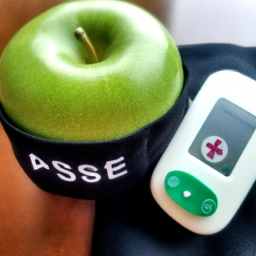
In this article, you will learn about the common symptoms of high blood pressure. High blood pressure, also known as hypertension, often does not have any noticeable symptoms. However, there are a few signs that could indicate you have high blood pressure.
One common symptom is frequent headaches, especially at the back of your head. Additionally, you may experience difficulty breathing or shortness of breath, even during normal activities. Chest pain or tightness in your chest can also be a symptom of high blood pressure.
In conclusion, it is important to be aware of the symptoms of high blood pressure, as it is a silent but serious condition. If you experience any of these symptoms, it is recommended to consult a healthcare professional to get your blood pressure checked and manage it properly. Remember, taking care of your health should always be a priority.
Understanding High Blood Pressure
High blood pressure, also known as hypertension, is a common medical condition that affects millions of people around the world. It occurs when the force of blood against the walls of your blood vessels is consistently too high. If left untreated, high blood pressure can cause serious damage to your organs, such as the heart, brain, and kidneys. It is important to understand the symptoms of high blood pressure so that you can recognize them early on and seek proper medical attention.
What is high blood pressure?
High blood pressure is defined as having a systolic blood pressure (the top number) of 130 mmHg or higher, or a diastolic blood pressure (the bottom number) of 80 mmHg or higher, on multiple occasions. Blood pressure is measured in millimeters of mercury (mmHg) and is expressed as two numbers: the systolic pressure over the diastolic pressure.
Blood pressure levels can fluctuate throughout the day, influenced by various factors such as physical activity, stress, and medications. However, consistently elevated blood pressure levels can indicate a problem and should be addressed.
How does high blood pressure develop?
High blood pressure can develop due to various factors. Some of the common causes include:
-
Age: The risk of developing high blood pressure increases with age. As you get older, the arterial walls start to stiffen, leading to an increase in blood pressure.
-
Family history: If you have a family history of high blood pressure, you are at a higher risk of developing the condition. Genetic factors play a role in determining your susceptibility to hypertension.
-
Obesity: Being overweight or obese puts extra strain on your heart, causing it to pump harder and leading to an increase in blood pressure.
-
Sedentary lifestyle: Lack of physical activity can contribute to the development of high blood pressure. Regular exercise helps to maintain healthy blood pressure levels.
-
Smoking: Smoking damages your blood vessels and increases your risk of developing high blood pressure. Quitting smoking is essential for both preventing and managing hypertension.
-
Alcohol consumption: Drinking excessive amounts of alcohol can raise your blood pressure. It is important to drink in moderation or avoid alcohol altogether.
-
High salt intake: Consuming too much salt can cause your body to retain fluid, increasing blood volume and consequently raising blood pressure. Limiting your salt intake is crucial for managing hypertension.
Risk Factors for High Blood Pressure
There are several risk factors that can increase your chances of developing high blood pressure. Understanding these risk factors can help you take proactive steps to prevent and manage hypertension.
Age
As mentioned earlier, the risk of developing high blood pressure increases with age. This is due to the natural aging process, which causes the arterial walls to become less elastic and more prone to plaque buildup.
Family history
If you have a family history of high blood pressure, your risk of developing the condition is higher. Genetics can play a significant role in determining your susceptibility to hypertension, so it is important to be aware of your family’s medical history.
Obesity
Being overweight or obese is a major risk factor for high blood pressure. The excess weight puts strain on the heart, leading to increased blood pressure. Losing weight through a combination of healthy eating and regular exercise is crucial for managing hypertension.
Sedentary lifestyle
Leading a sedentary lifestyle, with minimal physical activity, increases the risk of developing high blood pressure. Regular exercise helps to keep your heart and blood vessels healthy, reducing the chances of hypertension.
Smoking
Smoking damages your blood vessels and increases your risk of developing high blood pressure. The chemicals in cigarettes cause the arteries to narrow, making it harder for blood to flow through them. Quitting smoking is essential for managing hypertension.
Alcohol consumption
Drinking excessive amounts of alcohol can raise your blood pressure. Alcohol stimulates the release of certain hormones that can constrict your blood vessels and increase blood pressure. Limiting your alcohol intake or avoiding it altogether is crucial for managing hypertension.
High salt intake
Consuming too much salt can cause your body to retain fluid, leading to increased blood volume and subsequently raising blood pressure. Limiting your salt intake and opting for a low-sodium diet is an important step in managing hypertension.
Common Symptoms of High Blood Pressure
High blood pressure is often referred to as the “silent killer” because it typically does not cause any noticeable symptoms in its early stages. However, as the condition progresses, some people may experience certain symptoms that could indicate high blood pressure. It is important to note that these symptoms are not exclusive to high blood pressure, and other factors or underlying medical conditions can also cause these symptoms. If you experience any of the following symptoms, it is recommended to consult a healthcare professional for a proper diagnosis:
Headaches
Headaches, particularly in the morning or after physical exertion, can be a symptom of high blood pressure. However, it is important to note that headaches are a common symptom for many conditions, and having a headache does not necessarily indicate high blood pressure.
Shortness of breath
If you are experiencing difficulty breathing or shortness of breath, it may be a sign of high blood pressure. High blood pressure can cause the heart to work harder, leading to fluid buildup in the lungs and subsequent breathlessness.
Chest pain
Chest pain, also known as angina, can be a symptom of high blood pressure. However, chest pain could also be a sign of other heart-related conditions, so it is important to seek medical attention to determine the cause.
Dizziness
Feeling lightheaded or dizzy can be a symptom of high blood pressure. When blood pressure is too high, it can disrupt the balance of blood flow to the brain, leading to dizziness.
Nosebleeds
While nosebleeds are commonly associated with high blood pressure, they are not a reliable indicator of the condition. Nosebleeds can be caused by various factors, such as dry air, allergies, or other underlying medical conditions.
Fatigue
Persistent fatigue or tiredness can be a symptom of high blood pressure. When blood pressure is elevated, it puts strain on the heart and can lead to feelings of exhaustion.
Blurred vision
High blood pressure can affect the blood vessels in the eyes, leading to blurred or impaired vision. However, blurred vision can also be caused by other eye-related conditions that should be evaluated by an eye specialist.
Irregular heartbeat
An irregular heartbeat, also known as arrhythmia, can occur as a result of high blood pressure. The heart may struggle to pump blood effectively, leading to an irregular or rapid heartbeat.
Secondary Symptoms of High Blood Pressure
In addition to the common symptoms mentioned above, high blood pressure can also manifest in secondary symptoms that are not directly related to blood pressure but are caused by its effects on the body. These symptoms can vary from person to person and may include:
Trouble sleeping
High blood pressure can cause difficulty falling asleep or staying asleep throughout the night. This can be due to the physical discomfort caused by elevated blood pressure or the underlying stress and anxiety associated with the condition.
Difficulty concentrating
If you find it challenging to concentrate or often feel mentally foggy, it could be a secondary symptom of high blood pressure. The restricted blood flow to the brain can impact cognitive function and result in difficulty concentrating.
Memory problems
High blood pressure has been linked to cognitive decline and memory problems. The reduced blood flow to the brain can affect memory recall and overall cognitive function.
Anxiety
The constant worry and stress associated with managing high blood pressure can contribute to the development of anxiety. Anxiety can further elevate blood pressure, creating a vicious cycle.
Depression
Chronic illness, such as high blood pressure, can often lead to feelings of sadness and depression. It is important to seek emotional support and professional help when dealing with these symptoms.
Muscle tremors or twitches
In some cases, high blood pressure can cause muscle tremors or twitches, particularly in the hands and fingers. This is a less common symptom but can occur due to the disruption of normal blood flow.
Medical Complications Related to High Blood Pressure
If left untreated, high blood pressure can lead to various medical complications, some of which can be life-threatening. It is important to manage your blood pressure effectively to prevent these complications:
Heart attack
High blood pressure puts strain on the heart, increasing the risk of a heart attack. The elevated pressure can lead to the rupture of arteries or the development of blood clots, blocking blood flow to the heart.
Stroke
The continuous high pressure in the blood vessels can cause them to weaken or burst, leading to a stroke. A stroke occurs when the blood supply to the brain is disrupted, resulting in brain damage or death.
Kidney damage
High blood pressure can damage the delicate blood vessels in the kidneys, leading to reduced kidney function or even kidney failure. It is important to manage blood pressure to prevent long-term kidney damage.
Vision loss
The blood vessels in the eyes can be adversely affected by high blood pressure, leading to vision problems or even vision loss. Regular eye exams are essential for monitoring any changes in your vision.
Aneurysm
High blood pressure can cause the weakened blood vessel walls to bulge or balloon out, forming an aneurysm. If an aneurysm ruptures, it can result in severe internal bleeding and be life-threatening.
Peripheral artery disease
High blood pressure can lead to the narrowing or blockage of arteries in the legs, causing peripheral artery disease. This condition can result in pain, difficulty walking, and an increased risk of tissue damage or infection.
Diagnosing High Blood Pressure
Regular blood pressure checkups are essential for the early detection and management of high blood pressure. Your doctor can use various methods to diagnose and monitor your blood pressure, including:
Regular blood pressure checkups
During routine checkups, your doctor will use a blood pressure cuff and a stethoscope to measure your blood pressure. This will provide a baseline reading to monitor any changes over time.
Ambulatory blood pressure monitoring
Ambulatory blood pressure monitoring involves wearing a portable device that automatically measures your blood pressure at regular intervals over a 24-hour period. This method provides a more accurate representation of your blood pressure throughout the day.
Home blood pressure monitoring
Home blood pressure monitoring involves using a home blood pressure monitor to measure your blood pressure regularly at home. This can help to track your blood pressure trends and provide valuable information to your doctor.
Lifestyle and health history evaluation
Your doctor may evaluate your lifestyle and health history to identify potential risk factors for high blood pressure. This may involve discussing your diet, exercise habits, stress levels, family history, and other relevant factors.
Treatment options for High Blood Pressure
Fortunately, high blood pressure can often be effectively managed with a combination of lifestyle modifications and, in some cases, medications. The treatment plan for high blood pressure will depend on the severity of the condition and the individual’s specific health circumstances. Some common treatment options include:
Lifestyle modifications
Making healthy lifestyle changes is often the first line of defense in managing high blood pressure. This includes:
-
Adopting a healthy diet: A diet rich in fruits, vegetables, whole grains, lean proteins, and low-fat dairy products can help lower blood pressure. Avoiding or reducing sodium (salt) intake is crucial, as excessive salt can contribute to high blood pressure.
-
Regular exercise: Engaging in aerobic exercise, such as brisk walking, cycling, or swimming, for at least 150 minutes per week can help lower blood pressure. It is important to consult with your healthcare provider before starting a new exercise routine.
-
Stress management: Implementing stress-reducing techniques, such as deep breathing exercises, meditation, or yoga, can help lower blood pressure. Finding healthy outlets for stress, such as engaging in hobbies or spending time with loved ones, can also be beneficial.
-
Weight management: Losing weight can significantly lower blood pressure. Even a modest weight loss of 5-10% can have a positive impact on blood pressure levels.
Medications
In some cases, lifestyle modifications alone may not be sufficient to control high blood pressure. In these instances, your healthcare provider may prescribe medications to help lower your blood pressure. The specific medication(s) prescribed will depend on your individual circumstances and any underlying health conditions.
Dietary changes
In addition to adopting a healthy diet, your healthcare provider may recommend specific dietary changes to further manage your blood pressure. These may include reducing alcohol consumption, limiting caffeine intake, and avoiding certain foods that can raise blood pressure, such as processed foods or those high in saturated fats.
Regular exercise
Regular physical activity not only helps in managing high blood pressure but also improves overall cardiovascular health. Your healthcare provider may recommend an exercise routine tailored to your fitness level, taking into account any pre-existing medical conditions.
Stress management
Stress can contribute to elevated blood pressure levels. Incorporating stress management techniques, such as deep breathing exercises, meditation, or engaging in activities that bring you joy, can help in managing high blood pressure.
Weight management
Maintaining a healthy weight is crucial for managing high blood pressure. Your healthcare provider can help you develop a weight management plan that includes dietary modifications and regular physical activity.
Potential Complications of Untreated High Blood Pressure
If high blood pressure is left untreated or poorly managed, it can lead to various complications that can significantly impact your health and quality of life. Some potential complications include:
Heart disease
High blood pressure increases the strain on your heart, over time, leading to the development of heart disease. This can manifest as heart attacks, heart failure, or irregular heart rhythms.
Kidney disease
Untreated high blood pressure can damage the blood vessels in the kidneys, affecting their ability to filter waste and toxins from the blood. This can lead to chronic kidney disease and may eventually require dialysis or kidney transplant.
Vascular dementia
Consistently elevated blood pressure can cause damage to the small blood vessels in the brain, leading to vascular dementia. This type of dementia is characterized by memory loss, confusion, and difficulty thinking and reasoning.

Preventing High Blood Pressure
While certain risk factors for high blood pressure, such as age and family history, cannot be changed, there are steps you can take to prevent or manage the condition. Here are some preventive measures you can adopt:
Healthy diet
Following a healthy diet that is low in sodium, saturated fats, and processed foods can help prevent high blood pressure. Opt for a diet rich in fruits, vegetables, whole grains, lean proteins, and low-fat dairy products.
Regular exercise
Engaging in regular physical activity can help maintain a healthy weight and lower blood pressure. Aim for at least 150 minutes of moderate aerobic activity, such as brisk walking or cycling, each week.
Limiting alcohol intake
Drinking excessive amounts of alcohol can raise blood pressure. Limit your alcohol intake to moderate levels – one drink per day for women and two drinks per day for men.
Quitting smoking
Smoking damages your blood vessels and increases your risk of developing high blood pressure. Quitting smoking is one of the most effective ways to prevent and manage hypertension.
Stress reduction
Implement stress-reducing techniques, such as deep breathing exercises, meditation, or engaging in activities you enjoy. Finding healthy outlets for stress can help lower blood pressure.
Conclusion
High blood pressure is a serious medical condition that can lead to various complications if left untreated. While it often presents without noticeable symptoms, it is crucial to be aware of the risk factors and symptoms associated with high blood pressure. By recognizing the symptoms early on and adopting a healthy lifestyle, including regular exercise, a balanced diet, stress management, and adequate sleep, you can take control of your blood pressure and prevent further health issues. Remember to consult with your healthcare provider for a comprehensive evaluation and to discuss the best treatment options for your individual circumstances.



